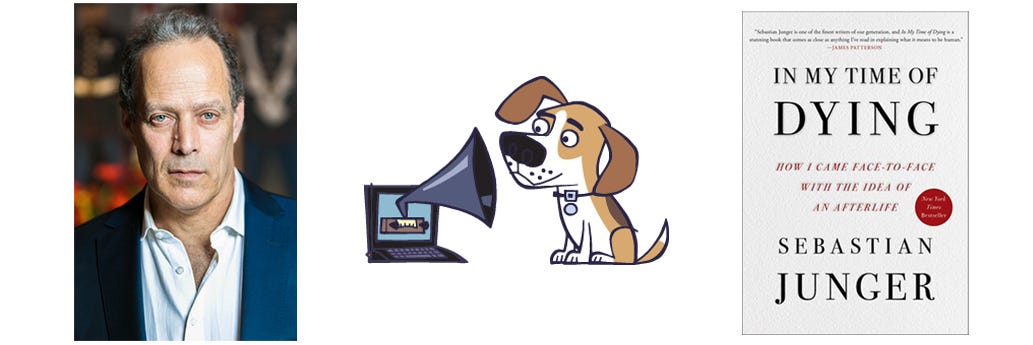Keep Calm, Carry On ... And Wait
Some thoughts on how to grapple with Trump 2.0
“It’s so sad to watch our new Government slowly dismantling all the Freedoms we have been fighting for and WON over the years,” tweeted Madonna, summing up much of the vibe in deep-blue America this week. She didn’t specify which freedoms, of course, but no one will mind. Her point was, to many, an obvious one: this democratically elected president is doing exactly what he said he’d do. And that is the end of democracy!
For ten years now, the resistance has echoed Madonna, and opposed Trump as a fascist, racist, un-American harbinger of democratic collapse. That ended up as Kamala Harris’ final argument in 2024. And in 2025 … it’s exactly the same! The DNC tweets that Trump is “Rolling back 60 years of progress on civil rights.” Top Dems are bringing in psychologists to cope with Trump’s “authoritarian behavior.” Turn on MSNBC — and it is forever 2017. Nicolle Wallace and Joy Reid are still trotting out Hitler comparisons — though this time, on Holocaust Remembrance Day. Trump is still putting non-whites in cages — though this time, it’s federal workers.
And new polling shows that Kamala is still the front-runner for the nomination next time around. If she balks, why not Dukakis? He’s only 91. A spring chicken by Dem standards. Meanwhile, the DNC hopefuls are backing a truly vital reform: a pledge “to appoint more than one transgender person to an at-large seat, and that the pick reflects the diversity of the trans community.” Not just trans but BIPOC trans! And a host at the DNC forum, Jonathan Capehart, is blaming racism and misogyny for Kamala’s loss — and everyone on stage agrees.
All I can say is that this is undeniably good news for Trump. He knows how to beat Democrats at this game, and he will continue to do so. By opposing him furiously on everything — especially immigration and DEI — the Democrats will deepen the ditch they are already flailing about in. This week, New York Magazine published a cover-story about a party hosted by a black Trumpite, neglected to mention him, cropped the cover-photo to exclude several black faces, and then ran a headline about the “cruelty” of white Trump supporters. It’s an exhausted, racist trope — but Brooklyn hipsters love it. And who doesn’t want a national party that primarily appeals to Brooklyn hipsters? It’s worked so well so far!
But if I were the Dems, I’d be less interested in the views of urban, Gaza-obsessed nonbinaries than those of your average American voter of any race. And the polling thus far suggests they like Trump’s immigration policies, still hate hiring on the basis of identity, and want less intervention abroad. In a NYT poll, 71 percent of Americans (including 54 percent of Dems) align with Trump on pushing back against sex reassignment for children; and 79 percent (including 67 percent of Dems) support him on preventing biological men competing with women in sports. That’s a mandate of sorts.
But Americans also strongly oppose pardoning violent J6 criminals, deporting those who came here as children, and prosecuting political opponents (73 percent oppose this, including 58 percent of Republicans). Americans want a leaner government, but if Trump brings chaos, they’ll rebel. They’re nervous about tariffs, and entitlements. In other words, if you calm down, support him on those issues where he is popular, and oppose him on those issues he isn’t, you might regain some traction by 2026.
Above all: do not make this a binary choice. If you do, Trump wins. Make it multiple choice, and he loses half the time. Focus on where Trump is vulnerable. Yes, on egregious violations of the law, or incompetence, call him out immediately. That’s how the spending freeze was unfrozen; that’s why Grassley and Durbin are already telling Trump to obey the law on his firing of Inspectors General. Judges are mobilizing. And this is how it is supposed to work. The Founders understood that the energetic executive they wanted could also over-reach. The Congress and courts were their solution. This is not the end of democracy. It’s just a testing period.
So take a breath. Part of the shock and awe of Trump’s first weeks was designed to disorient, and provoke the kind of breathless response we’ve seen. If we’ve learned anything this past decade (it appears the Dems and the MSM still haven’t), we shouldn’t oblige him. As Carville says, let Trump knock himself out. Wait until inflation rises with tariffs, until the Bannon-Broligarch battle gets hot, until Bondi makes a mistake. You get the picture.
Of course, I understand why emotions are high. But I also recall how emotions can cloud judgment, prevent effective opposition, and degenerate into mindless social media hysteria. It happened to all of us eight years ago — including me at times — and it failed. Time to change tack. Time to make distinctions. I’m sure I’ll screw up along the way, but, with your help, I’m going to chart a more discriminating and strategic path here on out. Let’s hope the Democrats get the message.
(Note to readers: This is an excerpt of The Weekly Dish. If you’re already a paid subscriber, click here to read the full version. This week’s issue also includes: my critical take on JD Vance’s distortion of Christ’s message of love; my talk with Sebastian Junger on near-death experiences, including his own; a ton of reader dissents over my second look at Trump and his EOs; eight notable quotes from the week in news, including two Yglesias Awards; 19 pieces on Substack we recommend on a variety of topics; a Mental Health Break of the great Kyle Dunnigan aping RFK Jr; a sparkling view of Bellevue at night; and, of course, the results of the View From Your Window contest — with a new challenge. Subscribe for the full Dish experience!)
From a new paid subscriber:
It’s so hard to know “where to sit” with politics these days, and I feel like I’ve been brainwashed by the NYTimes and MSNBC. I despise Trump as a person, yet I am strongly in favor of his return to sanity on DEI and gender ideology. Your views on the woke-authoritarian takeover of gay and lesbian rights by queer theory activists is so enlightening! I’ve been living in a left-wing fog.
From a re-subscriber:
I just wanted to send a note thanking you for another year of intelligent, brave, and funny conversations and essays. I’m always excited when I open the Weekly Dish or find out who is on the podcast this week, and I’m looking forward to another year in this community.
Vance On Jesus’ Support for Mass Deportations
JD Vance, a man not known for intellectual humility, has begun to instruct the Pope on Catholicism. It’s what new converts do. On Fox News, he gave what he called a Christian defense of mass deportations and strong borders. Money quote:
There’s this old-school [idea] — and I think it’s a very Christian concept, by the way — that you love your family, and then you love your neighbor, and then you love your community, and then you love your fellow citizens in your own country, and then after that, you can focus and prioritize the rest of the world. A lot of the far left has completely inverted that.
First off, as a political matter, Vance makes a decent point. It does makes sense for leaders of a country to concern themselves with citizens of that country before anyone else. But is this a Christian concept? Not so much.
(Read the rest of that piece here, for paid subscribers)
New On The Dishcast: Sebastian Junger
Sebastian is an author, journalist, and war correspondent. He’s been a contributing editor to Vanity Fair and a special correspondent at ABC News, and his debut documentary, Restrepo, was nominated for an Oscar. He’s the author of many bestsellers, including The Perfect Storm, War, Tribe, and Freedom. His latest: In My Time of Dying: How I Came Face to Face with the Idea of an Afterlife. It’s a fascinating account of his own brush with death — and how it changed his understanding of the universe and its mysteries.
Listen to the episode here. There you can find two clips of our convo — on the universal features of near-death experiences, and the mysteries of quantum physics. That link also takes you to commentary on our episode with John Gray over the state of liberalism in the West. We also air a bunch of dissents over my views on Trump’s executive orders, namely the trans and DEI ones. We also hear from a few readers personally impacted by Trump’s freeze on foreign aid, and I respond at length throughout.
Browse the Dishcast archive for an episode you might enjoy (the first 102 are free in their entirety — subscribe to get everything else). Coming up: Jon Rauch on the tribalism of white evangelicals, Ross Douthat on the supernatural, Evan Wolfson on the history of marriage equality, Yoni Appelbaum on how America stopped building things, Chris Caldwell on political upheaval in Europe, Nick Denton on the evolution of new media, and the great and powerful Mike White, of White Lotus fame. Please send any guest recs, dissents, and other comments to dish@andrewsullivan.com.
Dissents Of The Week: Trump Engagement Syndrome
A reader responds to my latest column:
I’ve had plenty of criticisms over your columns before, but I have never been so fervently repulsed by your writing as I was when I read how “exhilarated” you felt over a supposed “return to sanity” on, among other things, immigration. I will put aside the DEI issue (I don’t like most DEI but I think a blanket ban is unwise) and the transqueer debate (I largely agree with you but I also think that transgender people have good reason to fear a second Trump term). It is Trump’s actions on immigration, and your endorsement of them, that I find infuriating.
Which of his immigration plans do you find exhilarating? You don’t say. Despite “immigration” in the subtitle of your column, you say nothing about mass deportations other than them being “popular” — and you ignore birthright citizenship altogether. You insinuate that you do not merely favor, but are positively enthusiastic about, ripping hundreds of thousands of children from the arms of their undocumented parents and nullifying the 14th Amendment by executive fiat … but you won’t own up to these positions directly.
Read my response here, along with two other dissents. Many more are on the pod page — a doozy of debate this week. Please keep the criticism coming: dish@andrewsullivan.com.
In The ‘Stacks
This is a feature in the paid version of the Dish spotlighting about 20 of our favorite pieces from other Substackers every week. This week’s selection covers subjects such as DeepSeek, an Iron Dome for the US, and meth-fueled orgies. Below is one example, followed by a few new substacks:
Could a Ukrainian fungus help us get to Mars?
The Metropolitan Review — of new books and culture — joins Substack. So does the incomparable John Cleese — not dead yet!
Here’s a list of the substacks we recommend in general — call it a blogroll. If you have any suggestions for “In the ‘Stacks,” especially ones from emerging writers, please let us know: dish@andrewsullivan.com.
The View From Your Window Contest
Where do you think it’s located? Email your guess to contest@andrewsullivan.com. Please put the location — city and/or state first, then country — in the subject line. Proximity counts if no one gets the exact spot. Bonus points for fun facts and stories. The deadline for entries is Wednesday night at midnight (PST). The winner gets the choice of a VFYW book or two annual Dish subscriptions. If you are not a subscriber, please indicate that status in your entry and we will give you a free month subscription if we select your entry for the contest results (example here if you’re new to the VFYW). Contest archive is here. Happy sleuthing!
The results for this week’s window are coming in a separate email to paid subscribers later today. Below is the latest from our super-sleuth in Boulder, who every week creates a story of historical fiction based on the location, adding an AI illustration:
“Dust and Derricks” — Tulsa, 1935
The red dust found its way into everything. No matter how tightly we sealed the windows in my office at the University of Tulsa, it still crept in, coating my geology books with a fine crimson powder. From my window in Kendall Hall, I watched students hurry across campus, handkerchiefs pressed to their faces against the apocalyptic haze that had become all too familiar these past few years.
The Dust Bowl, they were calling it now. Back in '32, we thought it was just a bad spell of weather. By '35, we knew better. The papers had started calling them “black blizzards” — when the walls of dust rolled in, turning day to night. But here in Tulsa, the dust was more often red — from Oklahoma red dirt, picked up by the wind and thrown into the sky like God’s own warning.
My research on soil composition felt almost laughably inadequate in the face of what was happening. Farmers were abandoning their land in droves, many heading west to California. But Tulsa was different. The oil boom of the '20s had insulated us somewhat, since black gold still flowed when the earth wouldn’t yield crops.
“Dr. Mitchell?” My secretary, Ruth, appeared at the door, a telegram in her hand. “Message from the geology department at OU. They’re requesting your soil samples from the test sites.”
I nodded, glancing at the carefully labeled jars on my shelf. Each contained layers of soil from before the great drought, when Oklahoma’s earth still held life instead of just blowing away on the wind. “Tell them I’ll send what I can, but the latest samples are ... well, they’re mostly up in the air right now.”
Ruth managed a small smile. It was the kind of gallows humor we’d all developed. She’d lost her family’s farm near Bixby last year. Now she worked two jobs — here at the university during the day, and at the Mid-Continent refinery in the evenings. When the farms failed, there was always oil.
The telephone rang, and Ruth answered it. “Dr. Mitchell? President Tyrrell wants to see you. Something about the new research initiative.”
I grabbed my coat, wrapping my scarf around my face before stepping outside. The university’s Gothic buildings loomed through the reddish haze like ships in a strange fog. McFarlin Library’s spires were barely visible, though it was only noon. Students huddled in doorways, waiting for the wind to die down. Enrollment was down this year, since many families couldn’t afford tuition when their farms were yielding nothing but dust.
In President Tyrrell’s office, the windows were sealed with wet sheets — a common practice now to keep the dust out. He was hunched over reports from our experimental agriculture station south of campus. “Mitchell,” he said without looking up, “your soil analysis. What’s the verdict?”
I pulled out my latest findings. “The topsoil’s gone in most places. What’s left is too poor to sustain crops. But there’s something else: the oil companies’ seismic surveys are showing some interesting patterns in the underlying rock formations. If we can correlate that with the soil degradation ... ”
He nodded slowly. “Write it up. The regents need to understand why we’re proposing this joint geology-petroleum engineering program. Tulsa’s future isn’t just in what grows on top of the ground anymore.”
Walking back to Kendall Hall, I watched a group of students planting saplings along the campus paths — part of the university’s effort to create windbreaks. Most of the trees would die, but we kept planting. That’s what you did in Oklahoma: you persevered.
The dust was getting worse, but Tulsa endured. We weren’t just a farming town anymore. We were an oil town, a university town. As I reached my office, I could see the derricks in the distance, their silhouettes stark against the red sky. The earth might be blowing away, but underneath, there was still something worth digging for.
See you next Friday.





